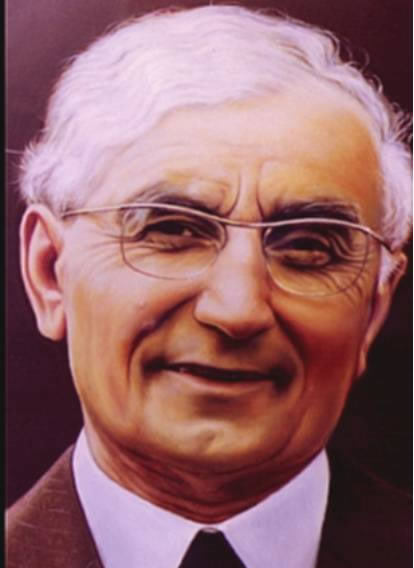The Founder: Birth
Bernhard Bendel 1908-1980
The founder of the Opus Spiritus Sancti is Rev. Fr. Bernhard Bendel. Bernhard Bendel was born on October 20th, 1908 in a little village called Steinfrenz, in the Westerwald District. Steinefrenz lies between the towns Limburg, Lahn and Montabaur, in the State of Hesse in Germany. His Father Heinrich Georg Bendel, and his mother Katharina n’ee Michel, were particularly good Catholics. They were very good parishioners of the Steinefrenz Parish in the Diocese of Limburg. He did his primary school in his village from 1915 to 1921. His secondary and high school was in place called Hamadar from 1922 to 1928. He was excellent in mathematics and physics. He was also good in aesthetics and used to play football. He could make good friends. He wanted to be an architect and a pilot but later he decided to become a priest.
The year before the outbreak of World War I (1914-1918) were called “Golden time” in Germany. That was because of the economic improvements, which had occurred in the years after 1871, during the former “Imperial Germany.” But the villages of the Westerward had hardly been touched by this upswing. The life of the farmers living on a small “Hofraite” was extremely hard and difficult. The Bendel family, including grandparents and children, had to work hard on their farm in order to make a living from their small, narrow fields. “The fields were so narrow because of peculiarities of the inheritance laws in the former duchy of Nassau. Moreover, the soil of this place was volcanic and was not very fertile. Due to these surrounding, people grew up to work hard, live modestly and stand firm on the necessity of life. They were people who were trustworthy, sincere and above all, deeply anchored in their faith. Christian faith was not merely a solemn trimming for certain family festivities, but rather, a strict part of their daily lives.
Steinefrenz village is situated between the river Dill, Lahn, Rhein and Sieg. Bernhard was born in this part of the countryside and was the oldest of his parent’s eleven children, six boys and five girls. In the family there were two priests and one nun: himself, his brother Berthod and his sister Tekla. The entire family was deeply religious, and the parents gave their children a good catholic education. The family attended Holy Mass daily with the children that were already going to school. They were strongly formed through worship of the Holy Eucharist and a sound devotion to the Sacred Heart of Jesus and the Blessed Virgin Mary. Every day after supper the whole family prayed the rosary and then the night prayers. God blessed the family and chose Bernhard to be a diocesan priest in the Diocese of Limburg, Sr. Thekla to be “ Schostaff”- Mary’s Sister and Berthod become a Pallottine Priest.
Bernhard attended elementary school in Steinefrenz for eight years. Then he studied Latin for three years. Knowledge of Latin was a pre-condition for acceptance in a higher school, the” Gymnasium” which itself led to the university. Instead of the Gymnasium, he managed to enter into Diocesan Minor Seminary in Hadmar at the age of fourteen.
The Minor Seminary was a boarding school lasting six years until the “Abitur” (a comprehensive exam marking graduation from high school). This occurred in the year 1928. While studying at the minor seminary of Hamadar, he had good times with other seminarians and teachers. He was befriended with everyone in the school. He respected them, loves them was ready to assist them whenever he was asked to do so. He built strong and friendly relationships which lasted for life. His personality was such that everybody appreciated him. He managed to deal with everyone in the school.
He was a bright student, a good athlete and did well in football. He had excellent grades at his final examination, especially in mathematics and physics. These led to tempting offers from industries. After the examinations, he immediately went to the Major Seminary. He already knew that his vocation was to become a priest and so he gave up professional opportunities of becoming a pilot and an architect.
Once he told us the extraordinary experience of his call to priesthood. Going for an evening stroll through the forest, he stopped by a small chapel to pray. While at prayer, he had the strange powerful feeling of Our lady requesting him “won’t you become a priest for love of me?
He began his studies in philosophy and theology at the collage of “St. Georgen” in Frankfurt am Main. He received financial support from the diocese under the form of an interest-free loan. St. Georgen theological collage belonged to German Jesuits. Up to now this college is still under the care of the Jesuits on the same bases of theological studies. Many priests and theologians of the diocese Limburg and many other dioceses studied at this college. The years from 1928 to 1933, as Bernhard was studying in Frankfurt, were years of great consequences for Germany. In the State, Communists and Nazis strove for power. In the Church, these years and those that followed, were a time of progress and liturgical movements, the Catholic youth movement and great number of vocations to priesthood and religious life.

